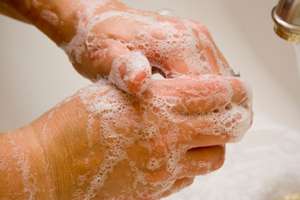Triclosan, a common antimicrobial in personal hygiene products, causes liver fibrosis and cancer in mice

Triclosan is an antimicrobial commonly found in soaps, shampoos, toothpastes and many other household items. Despite its widespread use, researchers at University of California, San Diego School of Medicine report potentially serious consequences of long-term exposure to the chemical. The study, published Nov. 17 by Proceedings of the National Academy of Sciences, shows that triclosan causes liver fibrosis and cancer in laboratory mice through molecular mechanisms that are also relevant in humans.
"Triclosan's increasing detection in environmental samples and its increasingly broad use in consumer products may overcome its moderate benefit and present a very real risk of liver toxicity for people, as it does in mice, particularly when combined with other compounds with similar action," said Robert H. Tukey, PhD, professor in the departments of Chemistry and Biochemistry and Pharmacology. Tukey led the study, together with Bruce D. Hammock, PhD, professor at University of California, Davis. Both Tukey and Hammock are directors of National Institute of Environmental Health Sciences (NIEHS) Superfund Programs at their respective campuses.
Tukey, Hammock and their teams, including Mei-Fei Yueh, PhD, found that triclosan disrupted liver integrity and compromised liver function in mouse models. Mice exposed to triclosan for six months (roughly equivalent to 18 human years) were more susceptible to chemical-induced liver tumors. Their tumors were also larger and more frequent than in mice not exposed to triclosan.
The study suggests triclosan may do its damage by interfering with the constitutive androstane receptor, a protein responsible for detoxifying (clearing away) foreign chemicals in the body. To compensate for this stress, liver cells proliferate and turn fibrotic over time. Repeated triclosan exposure and continued liver fibrosis eventually promote tumor formation.
Triclosan is perhaps the most ubiquitous consumer antibacterial. Studies have found traces in 97 percent of breast milk samples from lactating women and in the urine of nearly 75 percent of people tested. Triclosan is also common in the environment: It is one of the seven most frequently detected compounds in streams across the United States.
"We could reduce most human and environmental exposures by eliminating uses of triclosan that are high volume, but of low benefit, such as inclusion in liquid hand soaps," Hammock said. "Yet we could also for now retain uses shown to have health value—as in toothpaste, where the amount used is small."
Triclosan is already under scrutiny by the FDA, thanks to its widespread use and recent reports that it can disrupt hormones and impair muscle contraction.
More information: The commonly used antimicrobial additive triclosan is a liver tumor promoter, PNAS, www.pnas.org/cgi/doi/10.1073/pnas.1419119111
















